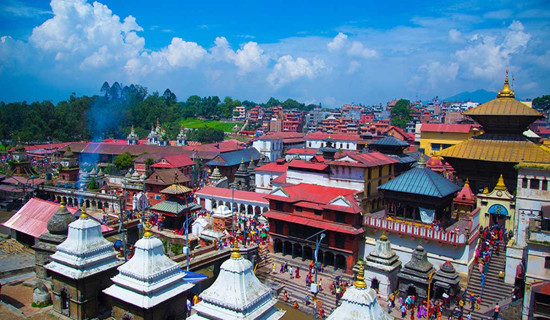- Saturday, 25 October 2025
Taking A Cue From China's Development Model
Finding happiness after enduring excessive pain and sorrow, restoring peace following brutal conflict, and achieving progress through indefatigable efforts and toils after severe destruction are essential sources of hope, pleasure, and prosperity. Various obstacles and challenges often arise as hindrances in the process of nation-building. However, these can ultimately be overcome through a combination of farsighted vision, a strong sense of national identity, unity, hard work, persistent dedication, and the contributions of people at all levels, all guided by wise and visionary leadership. History is a valuable medium for learning, acquiring knowledge and refining ideas and skills.
China, having a rich history of human civilisation, has been a source of inspiration for development and progress. However, there have been times when China has faced deep turmoil, violence, disorder, and disaster.
As Western powers rose, their influence and activities gradually spread across the world, and China could not remain unaffected. During the 19th and 20th centuries, China experienced significant Western domination, particularly in the form of business and missionary activity.
Anti-colonial struggles
However, colonisers failed to impose their hidden interests or fulfil their missions due to the resistance of the courageous people and their strong traditions. Although China suffered severe economic and military defeats, particularly in its struggles against the British Empire, and lost control over Taiwan following the civil war and Sino-Japanese War, the nation did not allow Western powers to exercise their hegemony over its territory.
In 1911, China's history took a pivotal turn when the Qing Dynasty was overthrown by notable leaders like Sun Yat-sen, Yuan Shikai, and Chiang Kai-shek, and the Republic of China was declared.
However, they struggled to maintain peace, stability, and harmony. The early 20th century was marked by turbulence, with the destructive effects of World War I and II, the invasion of Japan, and a subsequent civil war between the Communists and Nationalists. As a result, the pace of development faltered, and issues like corruption, poverty, unemployment, and inequality grew widespread. Consequently, the future of China seemed uncertain, like a sky overshadowed by dark clouds.
It is true that without taking risks, nothing is gained, but it is also important to recognise that building a nation and securing the future of its people is no minor challenge. The stakes involved were the lives, futures, prosperity, and dreams of the people, which could only be achieved through hope and trust in the people themselves. Even though frequent internal wars took place between nationalists and communists, the communists ultimately won the war in 1949, and Chairman Mao Zedong proclaimed the establishment of the "People's Republic of China" in Beijing. The rule of the proletariat began, eliminating feudal and capitalistic structures in society. Mao Zedong also implemented the concept of "seeking truth from facts" as part of the effort to achieve socialism.
Unfortunately, in the process of developing the nation, the Chinese people had to get involved in the Korean War and the Indian border conflict. Additionally, Mao launched the "Great Leap Forward" movement, aiming to modernise agriculture and industrialise the country. While this initiative may have contributed to the foundation of socialism, it ultimately caused immense suffering, pain, and problems for the people. Moreover, the country fell into another crisis due to the Cultural Revolution.
However, despite the consequences of these revolutions, they sparked a flame of change and development. Leaders and intellectuals reevaluated the situation, ensuring that the hope and trust of the people did not die. It was then that the great leader Deng Xiaoping formally declared that China was open to the world. Recognising the importance of modernisation and industrialisation, he proposed the "Reform and Opening Up" policy, which allowed China to engage with the global community. The four principles of modernisation focused on agriculture, industry, science and technology, and defence, all of which could be modernised through mutual exchange, support, and the extension of relations and connections.
At the same time, peace and stability were equally crucial for achieving the goal of modernisation. Thus, Deng's decision to extend China's relationships with Western and European countries, based on a non-aligned foreign policy, was a courageous and historic move. The reform and opening up" policy did not just become a milestone for change and prosperity; it also expanded opportunities for dialogue and contributed to the peaceful resolution of issues surrounding Hong Kong, Taiwan, and Macau. The concept of "One China, Two Systems" may have seemed strange at first, but in reality, China proved that two entities could coexist under the same umbrella through a sense of responsibility, mutual understanding, cooperation, and coordination.
Remarkably, China has alleviated poverty and revived the ancient Silk Road under the Belt and Road Initiative (BRI), promoting connectivity, equal sharing, and benefits. This has been a significant achievement in expanding trade, economy, knowledge, culture, science, and technology. These successes were made possible by resolute leadership, thoughtful planning and policy adjustments, self-criticism, and the hard work of the people.
The advances made today by China in areas such as science and technology, industry, sports, education, etc., are numerous. Remarkably, it has turned into the world's second-largest economy in the very short period of time. Yet the journey was extremely difficult and challenging, and through devotion, perseverance, and continuity, light began to shine for the nation.
Ideologically, a country can stand on any shore, but there is also great potential for learning and development if mutual coordination, collaboration, and connection are established between nations. This is the global age, where no nation can progress alone. China’s experience serves as a precedent for the world, particularly for developing countries. Its ideas, knowledge, and experiences can be valuable resources for fostering change and prosperity.
Lessons
Nepal, a developing country bordering China, is a sovereign, landlocked nation that has never been colonised. However, the country has faced challenges such as political turmoil, instability, corruption, unstable governments, unemployment, and unsustainable development practices. Every country pursues happiness; however, prosperity is not only wealth but also the accomplishment in different areas like agriculture, technology, industry, sports and education.
China has become prosperous in almost all of these areas, and Nepal can pick up many valuable things from China’s experience, especially in the areas of having a government that is stable, making peace and harmony, controlling the officers, and implementing the right development models.
Additionally, Nepal can learn from China’s strategies for skill-based education, modernising agriculture, and promoting trade and industry, alongside adopting sustainable plans and policies. Therefore, the value of China’s experience is both inevitable and crucial for the development of nations like Nepal.
(Dhakal is a research fellow at the University of Chinese Academy of Social Sciences, Guangzhou, China.)





-square-thumb.jpg)










